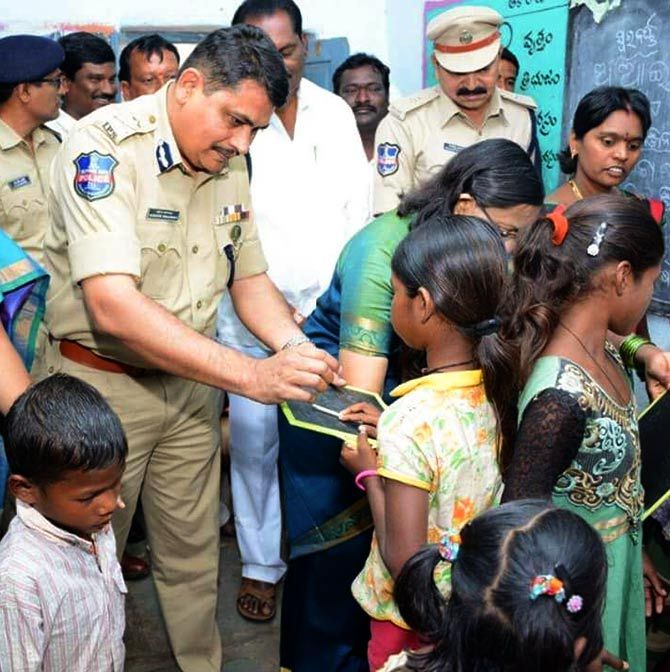Fighting sex trafficking and forced labour became Police Commissioner Mahesh Bhagwat's life mission.
The winner of the US State Department's 2017 Trafficking in Persons Report Heroes Award speaks to Rediff.com:

Mahesh Muralidhar Bhagwat, the police commissioner of Rachakonda in Telangana, has been conferred with the 2017 Trafficking in Persons Report Heroes Award by the United States State Department.
Bhagwat, the third Indian Police Service officer to be awarded the honour, shares his story:
I am from the 1995 IPS batch.
I was first posted in Manipur for two years -- as an assistant superintendent of police and then as additional SP.
In 1999, I joined the Andhra Pradesh police.
I was the SP of Adilabad from 2000 to 2004 when Naxalism was at its zenith, and this was one of the most affected areas.
All our energy went in controlling that one problem.
In 2004 I became the deputy commissioner of police, Hyderabad.
We heard news about a resort where girls from Mumbai and Kolkata were coming.
We raided it. We found a serious case of exploitation of girls.
The girls were staying in different parts of the city. We rescued the girls, arrested the customers and the organisers.
We worked with an NGO, which was working in the same field.
Then, I became the SP of Nalgonda district (now in Telangana).
Here, the Domara community was practicing prostitution as a family tradition.
I am from Maharashtra; I was shocked as the same community in Maharastra does not do this.
We raided places in Yadigirigunta and arrested them.
The ladies said, 'Give us an alternate profession.'
So, we worked with the collector and a scheme called Ashra was launched where allied government departments, NGOs, the Red Cross and corporates worked together to give the girls vocational training.
Self help groups (SHGs) were also formed, and the collector arranged for loans for these SHGs.
We put the children of these ladies and other school dropouts in a bridge school for a year.
After that, they were put in regular schools according to their age and aptitude.
The male youth of this community had been pimping till then; we trained them as security guards and made sure all of them got employment.
In 18 months we were able to rehabilitate 90 per cent of them.
Doordarshan made a documentary about this for a programme called Kiran.
I was awarded by the National Association of Chiefs of Police (he received the award in Boston, Massachusetts) for this effort.
I became the SP of the Women Protection Cell in Hyderabad in 2007.
There was a special project in five states to rescue women who had been trafficked into prostitution. I was the project officer.
We raided brothels in Bhiwandi, Thane, Mumbai, Pune, and Delhi and rescued a huge number of girls from Andhra Pradesh.
The traffickers were arrested, and the girls were given immediate relief of Rs 10,000.
In 2009, I became the DIG (deputy inspector general of police of Ellaru range, which includes the East and West Godavri districts and Krishna district (in Andhra Pradesh).
Girls from this area were being trafficked to different parts of the country and also being sent to the Gulf, Singapore and Malaysia.
We raided one place where prostitution was being practiced for 300 years.
With the help of the deputy collector, we raided 13 brothels there.
There was one girl from Chennai who had just passed her 10th standard and wanted to study nursing.
But a woman who ran a brothel had befriended her and decided to send her abroad; she had even applied for a passport for the girl.
We came to know about it, and arrested the woman and rescued the girl.
It resulted in a conviction and the woman was sent to jail for 10 years.
On July 1, 2015 the commissionerate of Rachakonda was formed, and I became the first commissioner.
Anti-trafficking has to be fought on a different level now.
Earlier, it was sex trafficking and now it is online trafficking.
You can order a girl from anywhere online.
We sent our men as customers and then raided the premises.
We rescued girls from as far apart as Haryana and Bangladesh.
Fifty apartments were being used as brothels. We sealed all of them with the help of the authorities.
We then turned our attention to forced labour.
Operation Smile had been launched by the central government to track missing children.
We rescued 498 children who had been brought here from Odisha. They were paid as little as Rs 1,500 for 6 months.
We contacted an NGO in Odisha and got teachers to come here.
We started a school here for one year. The students studied here for a year, and only after that were they sent to join schools back home.
We did not send them back immediately because we thought the parents might send them somewhere else again and the problem would not be solved.
After 2007, whenever a woman is arrested for prostitution she is not treated as an accused.
She is treated either as the complainant or as a witness.
We do not send them to prison, we send them to homes.
You must know that in jail they can easily come out on bail. It is not as easy to come out of our home.
Some people say that prostitution keeps the number of rapes down. We don't agree.
Will they say the same thing if someone from their family is in that profession?
Police Commissioner Mahesh Muralidhar Bhagwat spoke to Rediff.com's A Ganesh Nadar.
The children of red-light districts who made it out









